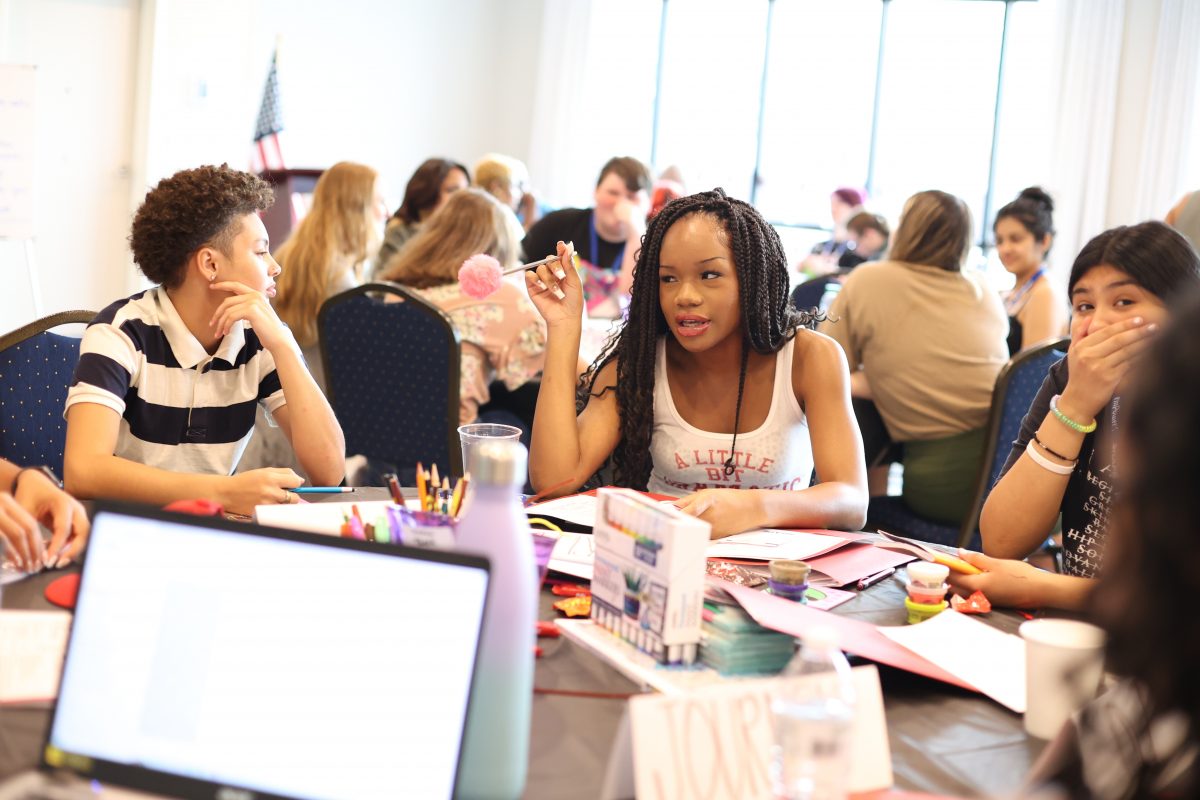Posts Tagged ‘conversations’
We Want Healthy Futures For Our Youth
I chose to become an educator because I want to equip youth with the tools necessary to be successful. Sexual health education particularly spoke to me because I know the potential outcomes of early sexual involvement and how these outcomes can have lasting impacts. Here at Teen emPower! Inc., we believe every young person deserves the chance to make healthy decisions that empower them to create the life of their dreams.
Of course, parents want the same thing. However, not all parents are equipped with the necessary sexual health information that young people need because of the lack of sexual health opportunities provided in our state and indeed, our country. Additionally, not all parents feel comfortable because, unfortunately, discussing sexual health topics remains taboo in many environments and cultures. That’s why we focus on teaching young people things they need to know about sexual health including consent, decision-making, relationships, self-esteem, and communication.
Today, more than ever, young people are exposed to unfiltered information via social media and the internet. While these resources can be a great source of community-building and story-telling, online sources for sexual health may not be age-appropriate or medically accurate. Teens need sexual health education provided in a safe, stable environment that will encourage them to make healthy social and personal decisions once they understand the potential outcomes of their choices.
There is a minority who would like to see sexual health education completely removed from schools. You may have seen them posting on social media or organizing public events. They are motivated by a fear-based misunderstanding of what our sexual health programs provide.
We want this group to acknowledge that our state ranks 4th highest for teen births and that 26% of new HIV infections occur among youth ages 13 to 24 years. We want them to know that the youth who experience our programs consistently report high levels of appreciation for this education and have expressed their gratitude in hundreds of thank you letters we have received.
If we want to see healthy futures for our youth, society needs to continue to support projects like our peer education program and sexual health education in schools.
- I encourage people in our community to speak up for themselves and for the young people who don’t have a political voice or who don’t vote yet. Speak up for the educational programs that help youth establish healthy goals, and speak out against those who seek to limit the impact of youth programs.
- I encourage parents to talk with their children at home about sexual health topics, including handling emotions in social settings and consent for any type of touch, not only sexual.
- I encourage teachers to speak with students about the impact they can make in their schools and overarching community so the students understand their value.
- I encourage influential adults to help youth with their developmental needs by encouraging community involvement, positive social skills, and boundary setting.
Developing assets for young people takes an involved community who is willing to devote themselves to youth needs. By supporting programs like Teen emPower!, you are supporting healthy futures for Oklahoma students.
Sexual Health Conversations at Home
Many parents and adults believe sexual health should be discussed at home. And, we agree!
Unfortunately, these conversations don’t often happen at home. In fact, the vast majority of our students report, albeit informally, that they do not talk about sex with parents or guardians. The purpose of sexual health education in schools is to provide young people with medically accurate, age appropriate information in a setting where they feel comfortable. The need for these conversations in school is great. When young people don’t get this information, the risk of them making unhealthy decisions increases which can lead to unintended consequences and greater public health concerns.
With public education class requirements being what they are, Teen emPower! staff feel fortunate to be allowed two weeks per session in classrooms, but we could use a lot more. While we accomplish a lot, it can be a struggle to create a welcoming environment, thoroughly educate the class on health topics, and reinforce what they learn in such a short amount of time. Therefore, if young people and their parents could start or continue conversations at home, we would see more collective success for adolescent health efforts.
So, how do parents start the talks at home?
Don’t worry, we’ve got you.
Conversation 1: Discuss what makes you, you.
This topic of conversation is important for teens and parents to understand each other as individuals, not just as family members. Discussing parts of ourselves, like the things we value, can open the door and lay a foundation for future difficult conversations. It can also help the young person feel that they can open up about their life to the parent/guardian in a safe environment.
Examples of conversation starters:
- What are some goals you have for your future? What do you want to become?
- What are some of the qualities you like about yourself? Why those?
Conversation 2: Discuss thoughts on relationships.
When we say relationships, we are talking about various types of relationships, not only romantic or sexual. It’s important for young people to understand the influence of their friends and develop an understanding of what a healthy relationship looks like.
Examples of conversation starters:
- What are the things you look for in a friendship?
- What are some qualities you would like in a partner?
- What qualities do you think make a healthy relationship? Should those qualities only be present in romantic or sexual relationships?
- What have you seen in other relationships that you would like for your own?
Conversation 3: Discuss how to make decisions.
Decision-making is a learned skill, and something young people might struggle with as their brains transition from concrete thinking to more abstract ideas. However, decision-making is the cornerstone of health and it is crucial for young people to learn that the decisions they make could lead to unintended outcomes.
Examples of conversation starters:
- How do you feel about making a tough decision?
- What do you think about getting to make decisions for yourself?
- If you have to make an important choice, what could you think about to help make that decision?
If you have a teenager at home, or if there is an important young person in your life, we hope these suggestions can help kickstart an open and trusting conversation. Don’t forget, they may not want to talk to you at first. Their feelings are running the show, so they may need some time to process. It’s important to view these discussion topics as continuous conversations, not a one-and-done exchange. Having these conversations will show them that you care, and that’s the most important part.


